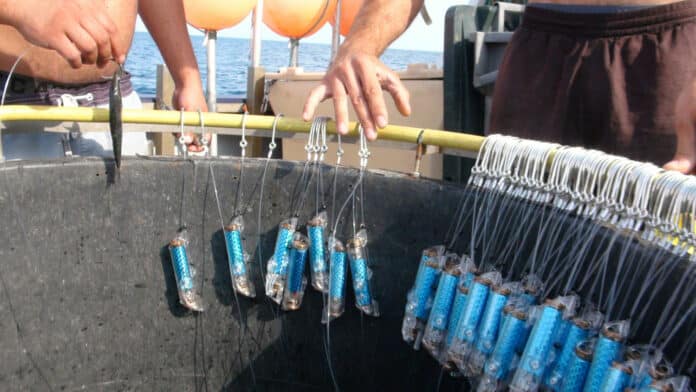Many shark and ray populations are declining due to overfishing, particularly oceanic species such as blue sharks and pelagic stingrays. They are commonly caught on fishing lines intended for other types of fish.
Now, some conservationists are working hard to find solutions to prevent sharks from getting caught accidentally on fishing lines. They developed a new technology called “SharkGuard,” that could allow longline fishing to continue while reversing the dramatic decline of endangered sharks around the world.
SharkGuard is powered by a small battery that attaches to longline fishing rigs. It emits a small, localized, pulsing electric field around a baited hook.
The device works by targeting the area around a shark’s nose and mouth, which is packed with electrical sensors. These sensory organs get overstimulated by the electric field generated by SharkGuard, which makes the sharks swim away from the danger of the baited fishing hooks without getting in the way of hooking other fish.
SharkGuard was developed by conservation engineers Fishtek Marine and tested by researchers at the University of Exeter.
In the sea trials that took place in July and August 2021 in southern France, the researchers tested the device’s efficacy by comparing the catches on two longline vessels that were fishing for bluefin tuna using both conventional hooks and SharkGuard hooks. The vessels made a total of 11 trips involving 22 longlines and a total deployment of 18,866 hooks.
The results showed that SharkGuard hooks significantly reduced the number of blue sharks and pelagic stingrays caught in comparison to standard control hooks. The baited lines fitted with SharkGuard reduced bycatch (accidental catching) of blue sharks by 91% and stingrays by 71%, which is encouraging for the team which developed it.
The catch rate of the target species, bluefin tuna, also appeared to decline (42%). The total number caught in the test period (on both lines with and without SharkGuard) was low, so further trials are needed to fully understand the effects of the device on target species.
The device does have limitations, including the need for frequent battery changes. The team is now working to overcome this barrier. SharkGuard still needs further testing and development, but it has the potential to be a global game-changer for the sustainability of longline fishing.
“There is an urgent need to reduce bycatch, which not only kills millions of sharks and rays each year but also costs fishers time and money,” said Dr. Phil Doherty of the Centre for Ecology and Conservation on Exeter’s Penryn Campus in Cornwall. “Our study suggests SharkGuard is remarkably effective at keeping blue sharks and pelagic stingrays off fishing hooks.”
Since 1970, the number of sharks worldwide has fallen by 71%. The scientists warned that, without sharks, the world’s oceans would become far less resilient to extreme climate events.
Journal reference:
- Philip D. Doherty, Robert Enever, Lucy C.M. Omeyer, Lydia Tivenan, Grant Course, Guy Pasco, David Thomas, Ben Sullivan, Ben Kibel, Pete Kibel, and Brendan J. Godley. Efficacy of a novel shark bycatch mitigation device in a tuna longline fishery. Current Biology, 2022; DOI: 10.1016/j.cub.2022.09.003
